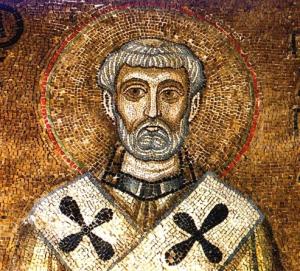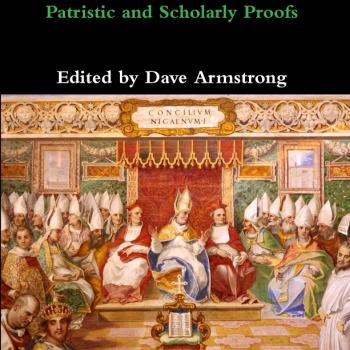Protestant apologists, in tackling the topic of sola Scriptura and whether the Church fathers believed in it or not, very often argue as follows:
Church Father X believes in sola Scriptura, because, look, see!: he praises Scripture in this place and that, and another over there, and says that Christians ought to read the Bible to learn theology! Obviously, then, he agrees with the formal Protestant principle of sola Scriptura! Who could possibly doubt it?
But this is fallacious and illogical through and through. The proper approach to this topic and what a given Church father believed is as follows:
Sola Scriptura (as classically defined by Protestants) means that Scripture is the only final infallible norm and source and standard (rule of faith) for Christian doctrine and faith. It follows from this, that neither the Church, nor ecumenical councils, nor popes, nor sacred, apostolic tradition, nor apostolic succession are infallible sources of authority. They are usually respected by the thinking Protestant, and regarded as authoritative to a degree, but not infallibly so.
We must, therefore, look to see if Church father X thinks Scripture is formally sufficient for authority (not just materially sufficient, which we agree with) without the necessary aid of tradition and the Church, or if he does not, as indicated in other statements. A thinker’s statements regarding Christian authority must be evaluated in context of all of his thought in this area, rather than having pieces taken out and then claiming that they “prove” something that they do not, in fact, prove at all.
In other words, even if we find a quote where a father seems (at first glance) to be stating something akin to sola Scriptura (since he is writing about the Bible without immediate reference to Church or tradition), we must examine what he believes about the (binding?, infallible?) authority of tradition, Church (including ecumenical councils), and apostolic succession, because the very question at hand (what is the rule of faith?) has to do with the relation of all those things (all but Scripture being non-infallible, according to sola Scriptura).
For that reason, their beliefs concerning all these other elements have to be examined, in order to understand properly how they views their relationship vis-a-vis each other, and whether or not they adhere to sola Scriptura. as the rule of faith. If they hold to the infallible authority of anything besides Scripture, they do not believe in sola Scriptura.
The Protestant always puts the Bible above Church and tradition, and denies that the latter two can be infallible. Catholics and Orthodox believe in a three-legged stool, where, practically-speaking, Church and tradition have equal authority with Scripture, because they are the necessary framework and interpretive grid through which Scripture can be properly interpreted in an orthodox sense.
With this in mind, we proceed to determine whether St. Clement of Rome believed in sola Scriptura, or the Catholic rule of faith. The material below is from Clement’s First Letter to the Corinthians (all on one web page in Schaff’s 38-volume collection of the Church fathers) unless otherwise noted. Catholics consider Clement, as the fourth bishop of Rome and successor to St. Peter as pope. The date most mentioned as the time of the writing of this epistle is 96 AD.
Sacred Tradition
Wherefore let us forsake idle and vain thoughts; and let us conform to the glorious and venerable rule which hath been handed down to us; (ch. 7, J. B. Lightfoot translation, published in 1891)
[L]et us conform to the glorious and holy rule of our tradition. (ch. 7; revised translation of Lightfoot, in The Apostolic Fathers, second edition; edited and revised by Michael W. Holmes, Grand Rapids, Michigan: Baker Book House, 1989, p. 32)
Wherefore let us put aside empty and vain cares, and let us come to the glorious and venerable rule of our tradition, (ch. 7, Kirsopp Lake translation, 1912)
Let us . . . turn to the glorious and venerable rule of our tradition. (ch. 7, James A. Kleist, S.J. translation, 1946)
[L]et us turn to the renowned and solemn standard that has come down to us, (ch. 7, Edgar J. Goodspeed translation, 1950)
Therefore, let us . . . approach the renowned and honorable rule (canon) of our tradition. (ch. 7, Kevin P. Edgecomb translation, 2006)
St. Clement also cites as “Scripture” in 23:3-4 a source that is not in the Bible, as later determined:
Far be that Scripture from us, where it says, “Wretched are the double-minded, the doubters of soul, who say, ‘These things were even heard by our fathers, and behold, we have grown old and none of them have happened to us.’ “You mindless ones! Compare yourselves to a tree; take the vine. Indeed, first it sheds leaves, then a bud is produced, then a leaf, then a flower, and after these, an unripe grape, becoming then a bunch of grapes.” (ch. 23; Kevin P. Edgecomb translation, 2006)
Some speculate that the citation was from the lost book of Eldad and Modat mentioned in the Shepherd of Hermas (Vis. 2.3.4). Translators Kirsopp Lake, J. B. Lightfoot, and Goodspeed also use the word “Scripture” in 23:3. Schaff, however, translates, “that which is written”: perhaps translation bias, as we also arguably see in his rendition of chapter 7.
Apostolic Succession
[L]et us conform to the glorious and venerable rule which hath been handed down to us; (ch. 7, J. B. Lightfoot translation)
[L]et us turn to the renowned and solemn standard that has come down to us, (ch. 7, Edgar J. Goodspeed translation, 1950)
The apostles have preached the gospel to us from the Lord Jesus Christ; Jesus Christ [has done so] from God. Christ therefore was sent forth by God, and the apostles by Christ. Both these appointments, then, were made in an orderly way, according to the will of God. Having therefore received their orders, and being fully assured by the resurrection of our Lord Jesus Christ, and established in the word of God, with full assurance of the Holy Ghost, they went forth proclaiming that the kingdom of God was at hand. And thus preaching through countries and cities, they appointed the first fruits [of their labours], having first proved them by the Spirit, to be bishops and deacons of those who should afterwards believe. Nor was this any new thing, since indeed many ages before it was written concerning bishops and deacons. For thus says the Scripture in a certain place, “will appoint their bishops in righteousness, and their deacons in faith.” (ch. 42)
Our apostles also knew, through our Lord Jesus Christ, that there would be strife on account of the office of the episcopate. For this reason, therefore, inasmuch as they had obtained a perfect fore-knowledge of this, they appointed those [ministers] already mentioned, and afterwards gave instructions, that when these should fall asleep, other approved men should succeed them in their ministry. We are of opinion, therefore, that those appointed by them, or afterwards by other eminent men, with the consent of the whole church, and who have blamelessly served the flock of Christ, in a humble, peaceable, and disinterested spirit, and have for a long time possessed the good opinion of all, cannot be justly dismissed from the ministry. (ch. 44)
Petrine Primacy / Papacy
If, however, any shall disobey the words spoken by Him through us, let them know that they will involve themselves in transgression and serious danger; . . . (ch. 59)
Joy and gladness will you afford us, if you become obedient to the words written by us and through the Holy Spirit root out the lawless wrath of your jealousy according to the intercession which we have made for peace and unity in this letter. (ch. 63)
I wrote about these ostensibly “papal” passages at some length. Here are some of my observations:
Why is it that Clement is speaking with authority from Rome, settling the disputes of other regions [Corinth was about 743 miles from Rome]? Why didn’t the Corinthians solve it themselves, if they had a proclaimed bishop or even if they didn’t claim one at the time? Why did they appeal to the bishop of Rome? . . .
Clement definitely asserts his authority over the Corinthian church far away. Again, the question is: “why?” What sense does that make in a Protestant-type ecclesiology where every region is autonomous and there is supposedly no hierarchical authority in the Christian Church? Why must they “obey” the bishop from another region? Not only does Clement assert strong authority; he also claims (twice) that Jesus and the Holy Spirit are speaking “through” him.
That is extraordinary, and very similar to what we see in the Jerusalem Council in Acts 15:28 (“For it has seemed good to the Holy Spirit and to us to lay upon you no greater burden than these necessary things”: RSV) and in Scripture itself. It’s not strictly inspiration but it is sure something akin to infallibility (divine protection from error and the pope as a unique mouthpiece of, or representative of God). . . .
[W]hy does Corinth have to obey Rome? Who determined that set-up? Why does it even cross their mind to write to a local church far away to settle their problems, and why does Clement assume that they should obey him, and that it would be “transgression and serious danger” if they don’t?
***
Related Reading
For much more on sola Scriptura: see my Bible, Tradition, Canon, & “Sola Scriptura” web page.
For documentation of many more Church fathers who rejected sola Scriptura, see the “Bible” section of my Fathers of the Church web page.
***
Practical Matters: Perhaps some of my 3,900+ free online articles (the most comprehensive “one-stop” Catholic apologetics site) or fifty books have helped you (by God’s grace) to decide to become Catholic or to return to the Church, or better understand some doctrines and why we believe them.
Or you may believe my work is worthy to support for the purpose of apologetics and evangelism in general. If so, please seriously consider a much-needed financial contribution. I’m always in need of more funds: especially monthly support. “The laborer is worthy of his wages” (1 Tim 5:18, NKJV). 1 December 2021 was my 20th anniversary as a full-time Catholic apologist, and February 2022 marked the 25th anniversary of my blog.
PayPal donations are the easiest: just send to my email address: [email protected]. You’ll see the term “Catholic Used Book Service”, which is my old side-business. To learn about the different methods of contributing, including 100% tax deduction, etc., see my page: About Catholic Apologist Dave Armstrong / Donation Information. Thanks a million from the bottom of my heart!
***
Photo credit: Pope St. Clement of Rome. Mosaic from St. Sophia of Kyiv, c. 1000 [public domain / Wikimedia Commons]
***
Summary: I prove that St. Clement of Rome did not believe in the Protestant rule of faith: sola Scriptura, and that he accepted the authority of apostolic succession & tradition.














